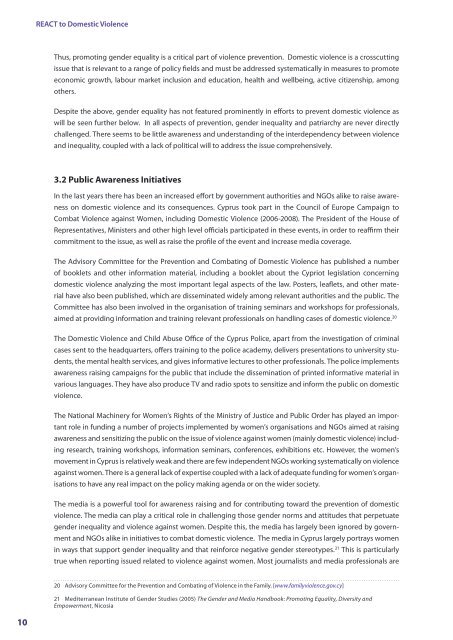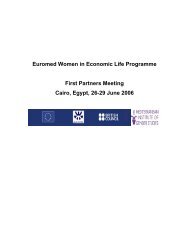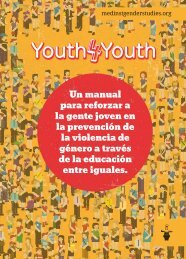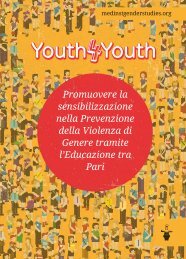react to domestic violence
react to domestic violence
react to domestic violence
You also want an ePaper? Increase the reach of your titles
YUMPU automatically turns print PDFs into web optimized ePapers that Google loves.
REACT <strong>to</strong> Domestic Violence<br />
Thus, promoting gender equality is a critical part of <strong>violence</strong> prevention. Domestic <strong>violence</strong> is a crosscutting<br />
issue that is relevant <strong>to</strong> a range of policy fields and must be addressed systematically in measures <strong>to</strong> promote<br />
economic growth, labour market inclusion and education, health and wellbeing, active citizenship, among<br />
others.<br />
Despite the above, gender equality has not featured prominently in efforts <strong>to</strong> prevent <strong>domestic</strong> <strong>violence</strong> as<br />
will be seen further below. In all aspects of prevention, gender inequality and patriarchy are never directly<br />
challenged. There seems <strong>to</strong> be little awareness and understanding of the interdependency between <strong>violence</strong><br />
and inequality, coupled with a lack of political will <strong>to</strong> address the issue comprehensively.<br />
3.2 Public Awareness Initiatives<br />
In the last years there has been an increased effort by government authorities and NGOs alike <strong>to</strong> raise awareness<br />
on <strong>domestic</strong> <strong>violence</strong> and its consequences. Cyprus <strong>to</strong>ok part in the Council of Europe Campaign <strong>to</strong><br />
Combat Violence against Women, including Domestic Violence (2006-2008). The President of the House of<br />
Representatives, Ministers and other high level officials participated in these events, in order <strong>to</strong> reaffirm their<br />
commitment <strong>to</strong> the issue, as well as raise the profile of the event and increase media coverage.<br />
The Advisory Committee for the Prevention and Combating of Domestic Violence has published a number<br />
of booklets and other information material, including a booklet about the Cypriot legislation concerning<br />
<strong>domestic</strong> <strong>violence</strong> analyzing the most important legal aspects of the law. Posters, leaflets, and other material<br />
have also been published, which are disseminated widely among relevant authorities and the public. The<br />
Committee has also been involved in the organisation of training seminars and workshops for professionals,<br />
aimed at providing information and training relevant professionals on handling cases of <strong>domestic</strong> <strong>violence</strong>. 20<br />
The Domestic Violence and Child Abuse Office of the Cyprus Police, apart from the investigation of criminal<br />
cases sent <strong>to</strong> the headquarters, offers training <strong>to</strong> the police academy, delivers presentations <strong>to</strong> university students,<br />
the mental health services, and gives informative lectures <strong>to</strong> other professionals. The police implements<br />
awareness raising campaigns for the public that include the dissemination of printed informative material in<br />
various languages. They have also produce TV and radio spots <strong>to</strong> sensitize and inform the public on <strong>domestic</strong><br />
<strong>violence</strong>.<br />
The National Machinery for Women’s Rights of the Ministry of Justice and Public Order has played an important<br />
role in funding a number of projects implemented by women’s organisations and NGOs aimed at raising<br />
awareness and sensitizing the public on the issue of <strong>violence</strong> against women (mainly <strong>domestic</strong> <strong>violence</strong>) including<br />
research, training workshops, information seminars, conferences, exhibitions etc. However, the women’s<br />
movement in Cyprus is relatively weak and there are few independent NGOs working systematically on <strong>violence</strong><br />
against women. There is a general lack of expertise coupled with a lack of adequate funding for women’s organisations<br />
<strong>to</strong> have any real impact on the policy making agenda or on the wider society.<br />
The media is a powerful <strong>to</strong>ol for awareness raising and for contributing <strong>to</strong>ward the prevention of <strong>domestic</strong><br />
<strong>violence</strong>. The media can play a critical role in challenging those gender norms and attitudes that perpetuate<br />
gender inequality and <strong>violence</strong> against women. Despite this, the media has largely been ignored by government<br />
and NGOs alike in initiatives <strong>to</strong> combat <strong>domestic</strong> <strong>violence</strong>. The media in Cyprus largely portrays women<br />
in ways that support gender inequality and that reinforce negative gender stereotypes. 21 This is particularly<br />
true when reporting issued related <strong>to</strong> <strong>violence</strong> against women. Most journalists and media professionals are<br />
20 Advisory Committee for the Prevention and Combating of Violence in the Family. [www.family<strong>violence</strong>.gov.cy]<br />
21 Mediterranean Institute of Gender Studies (2005) The Gender and Media Handbook: Promoting Equality, Diversity and<br />
Empowerment, Nicosia<br />
10







